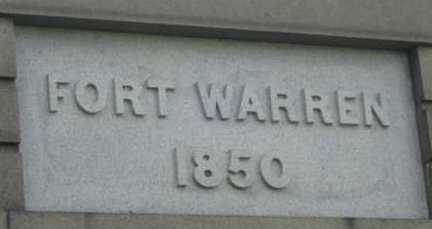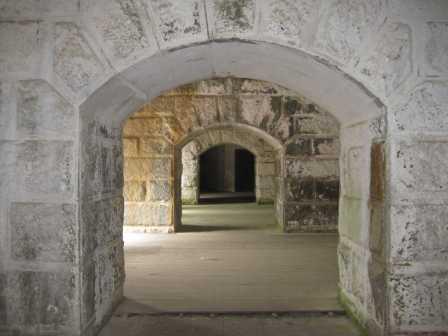By Kathleen Barker, Education Department
Early on the morning of June 10, 2012, I found myself standing in a parking lot in Woburn, Mass., with dozens of bleary-eyed middle- and high-school students. Despite the early hour there was a touch of excitement in the air, for these talented young ladies and gentlemen were waiting for the buses that would take them to the National History Day (NHD) finals at the University of Maryland in College Park. The 2012 contest was the largest ever in NHD history, and while 2,794 students participated in this year’s national competition, that number represents only a fraction of the students who participated in National History Day during the 2011-2012 school year.
For the students gathered in College Park, the national competition represented the zenith of a process that began nearly nine months earlier. Soon after the 2012 theme, “Revolution, Reaction, Reform in History,” was announced, students began investigating potential topics, exploring local (and not-so-local) libraries and archives, and creating exhibits, performances, documentaries, websites, or papers. Students from across the United States consulted collections at the Massachusetts Historical Society for this year’s competition. The Library Reader Services staff fielded reference calls and emails on topics such as the Boston Tea Party, the Battle of Bunker Hill, Horace Mann and nineteenth-century school reform, Dorthea Dix, and the abolition of slavery.
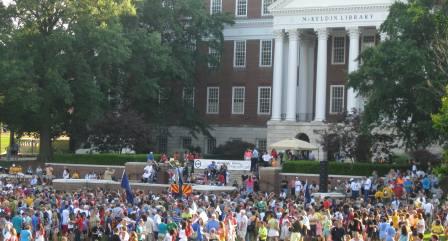 I was fortunate enough to travel with the Massachusetts delegation to this year’s national competition. The festivities began on the evening of Sunday, June 10, with a rousing opening ceremony on the lawn at McKeldin Library. Imagine thousands of students, parents, and teachers cheering, chattering, and trading pins and you’ll have a good sense of what the opening ceremony was like. The competition got down to business on Monday morning, and while in College Park I had the opportunity to serve as a judge along with more than 300 other historians and other education professionals. Anyone who has ever judged at a history day competition can tell you what an amazing experience this is. I met with many talented and enthusiastic students over the course of the three-day competition. They taught me a great deal about topics as diverse as Levittown, the use of helicopters in the Vietnam War, and Nicola Tesla. Thanks to a very well illustrated project on Civil War hospitals, I also have new appreciation for modern medicine.
I was fortunate enough to travel with the Massachusetts delegation to this year’s national competition. The festivities began on the evening of Sunday, June 10, with a rousing opening ceremony on the lawn at McKeldin Library. Imagine thousands of students, parents, and teachers cheering, chattering, and trading pins and you’ll have a good sense of what the opening ceremony was like. The competition got down to business on Monday morning, and while in College Park I had the opportunity to serve as a judge along with more than 300 other historians and other education professionals. Anyone who has ever judged at a history day competition can tell you what an amazing experience this is. I met with many talented and enthusiastic students over the course of the three-day competition. They taught me a great deal about topics as diverse as Levittown, the use of helicopters in the Vietnam War, and Nicola Tesla. Thanks to a very well illustrated project on Civil War hospitals, I also have new appreciation for modern medicine.
Alas, the contest did eventually come to end. After three days of intense but rewarding competition, winners were announced at a ceremony at the University’s Comcast Center on June 14, 2012. The event 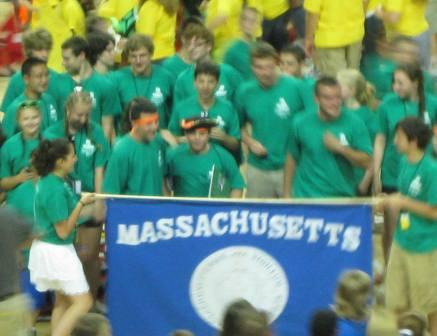 began with the best parade I’ve ever seen: a parade of participating students across the floor of the arena. I watched over 2,000 students circle the arena with everything from state flags to inflatable lobsters! Throughout the morning, dozens of students were singled out for awards and special prizes, and the boisterous crowd made sure that each winner was duly appreciated. Prizes were sponsored not only by NHD but by friends of history like the National Endowment for the Humanities, the History Channel, and the National World War II Museum. Several students from Massachusetts took home special prizes, but a special congratulations goes to our lone award winner, Chad Nowlan of Holyoke Catholic High School, who placed second in the Individual Performance category for his project, “From Revolution to Constitution, Shays’ Rebellion.” (You can find a complete list of winners on the NHD website.)
began with the best parade I’ve ever seen: a parade of participating students across the floor of the arena. I watched over 2,000 students circle the arena with everything from state flags to inflatable lobsters! Throughout the morning, dozens of students were singled out for awards and special prizes, and the boisterous crowd made sure that each winner was duly appreciated. Prizes were sponsored not only by NHD but by friends of history like the National Endowment for the Humanities, the History Channel, and the National World War II Museum. Several students from Massachusetts took home special prizes, but a special congratulations goes to our lone award winner, Chad Nowlan of Holyoke Catholic High School, who placed second in the Individual Performance category for his project, “From Revolution to Constitution, Shays’ Rebellion.” (You can find a complete list of winners on the NHD website.)
It takes a cast thousands to make History Day happen every year. Kudos to the national staff for making NHD a successful enterprise for more than 30 years! A special thanks to the Massachusetts History Day co-coordinators, Bill Szachowicz and Bob Jones, as well as all the members of the Massachusetts History Day board, who volunteer many hours to make History Day happen in Massachusetts. Thank you to all of the teachers, librarians, archivists, parents, and other mentors who shepherded students through the historical research process. Last, but certainly not least, a hearty congratulations to all of the students who participated in National History Day this year. These dedicated students gave up their evenings, weekends, and even school vacations to engage with the past. In the end, they are ALL winners!
If History Day sounds like tons of fun (and it is), learn more about the 2012-2013 contest theme, “Turning Points in History” at the NHD website. Visit the Massachusetts History Day website for information about participating in contests in the Commonwealth. Finally, come back to the MHS website in September 2012 to find out how the Society can help you with your History Day research.


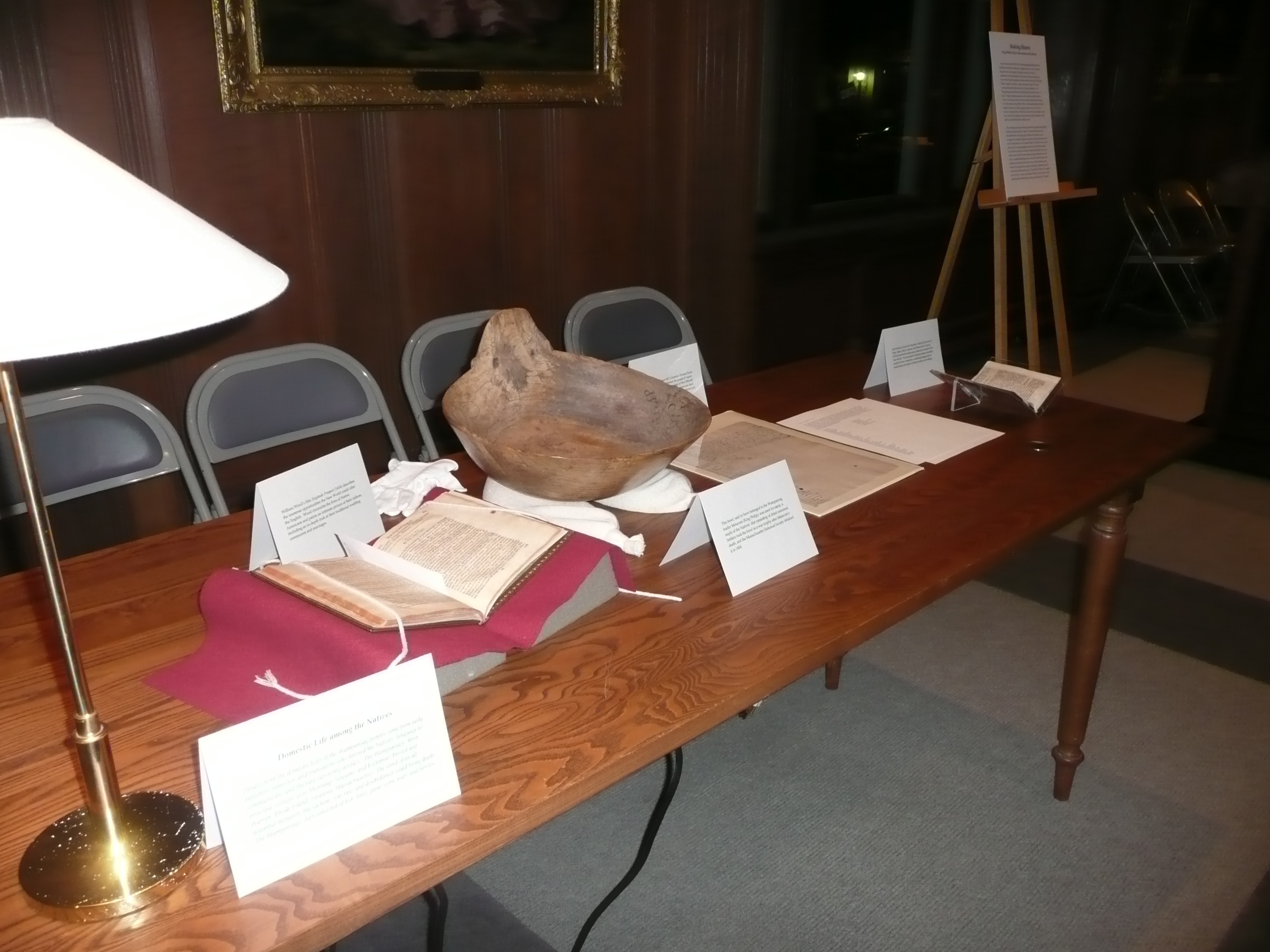 Students visited the MHS several times, both as a class and as individual researchers. They had the opportunity to analyze a series of manuscripts and published documents. Pamphlets such as John Eliot’s Strength Out of Weakness (1652), describe Puritan’s attempts to convert Indians to Christianity, while other works, like William Hubbard’s The Present State of New-England: Being a Narrative of theTroubles with the Indians in New-England (1677) suggest that not all native peoples were willing to adopt English customs or religious principles. Class members also transcribed a number of documents from the Winslow family papers, which include the papers of Edward and Josiah Winslow, colonial governors of Plymouth Colony from 1638-1680. Several letters in the collection detail colonists’attempts to negotiate with Metacom and other native inhabitants, even as native groups began forming alliances against the English settlers.
Students visited the MHS several times, both as a class and as individual researchers. They had the opportunity to analyze a series of manuscripts and published documents. Pamphlets such as John Eliot’s Strength Out of Weakness (1652), describe Puritan’s attempts to convert Indians to Christianity, while other works, like William Hubbard’s The Present State of New-England: Being a Narrative of theTroubles with the Indians in New-England (1677) suggest that not all native peoples were willing to adopt English customs or religious principles. Class members also transcribed a number of documents from the Winslow family papers, which include the papers of Edward and Josiah Winslow, colonial governors of Plymouth Colony from 1638-1680. Several letters in the collection detail colonists’attempts to negotiate with Metacom and other native inhabitants, even as native groups began forming alliances against the English settlers.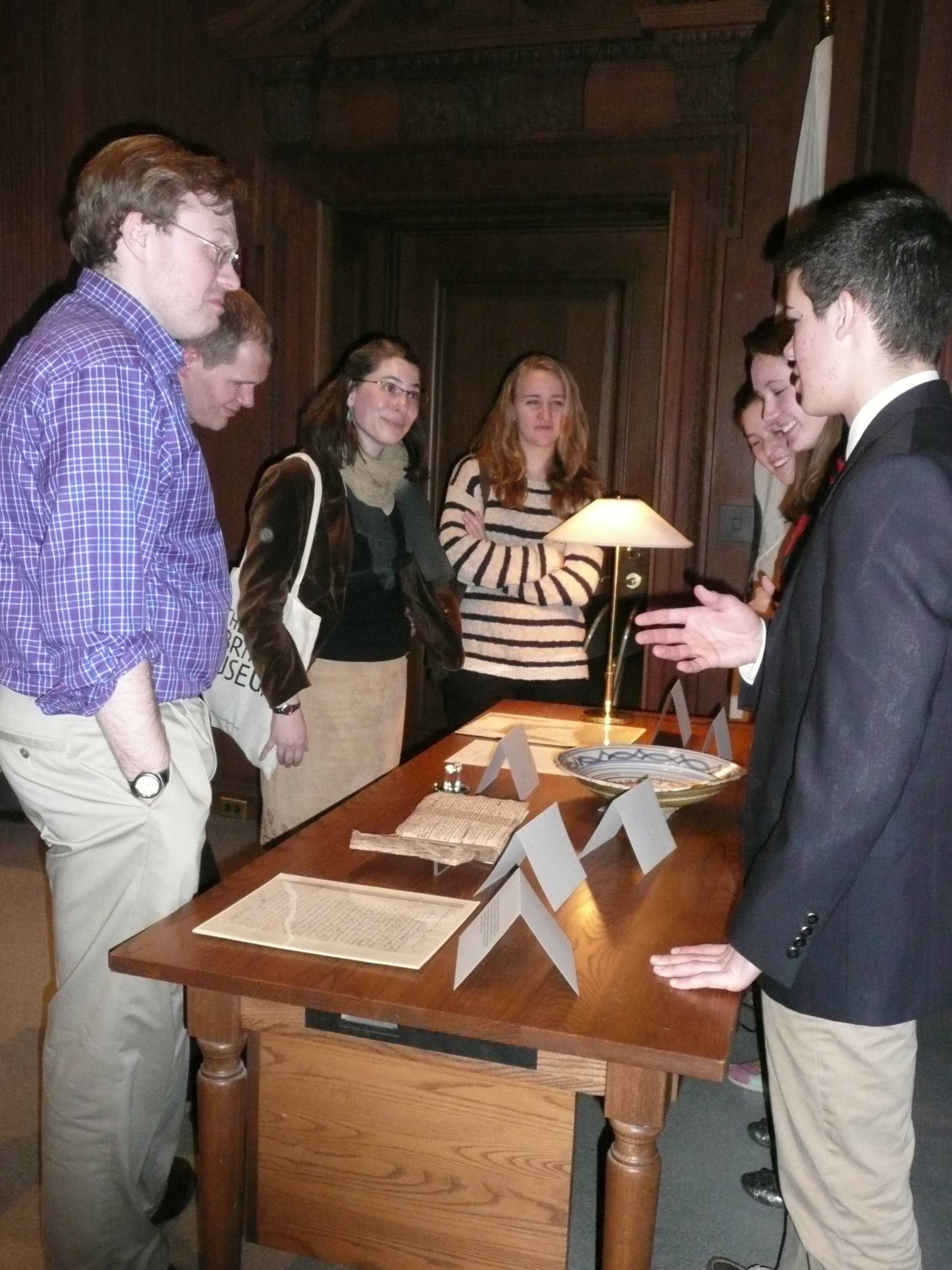
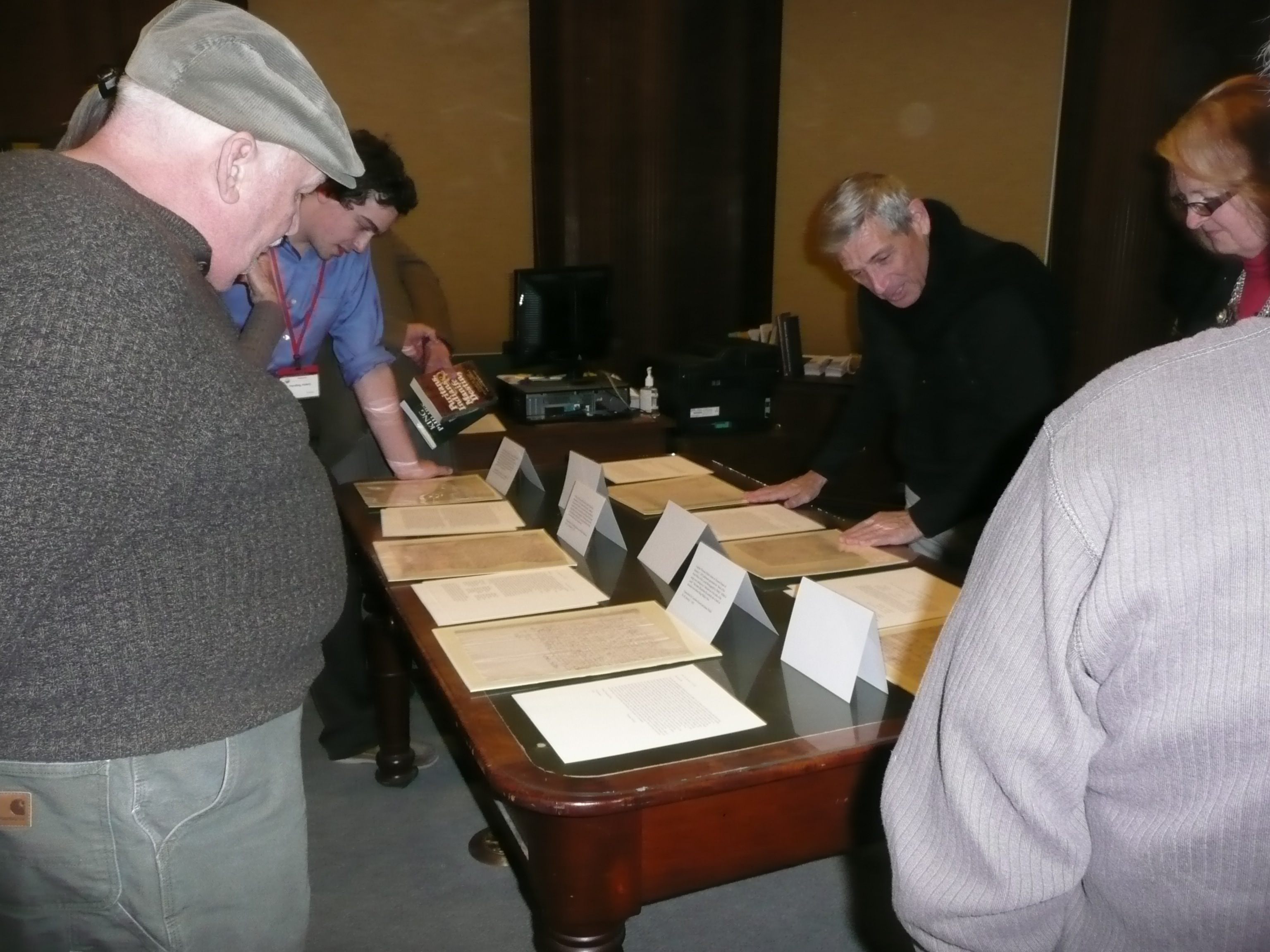
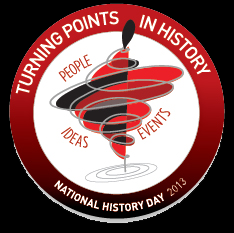

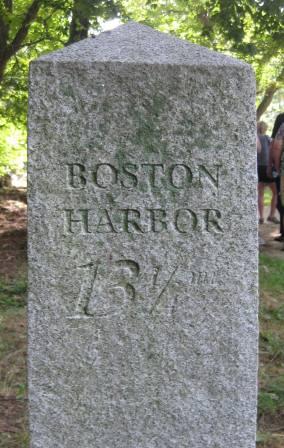 By Wednesday participants were ready to take a closer look at the first day of the revolution. We toured many different sites, including Lexington Green, Paul Revere’s capture site, and the North Bridge in Concord, as we
By Wednesday participants were ready to take a closer look at the first day of the revolution. We toured many different sites, including Lexington Green, Paul Revere’s capture site, and the North Bridge in Concord, as we I was fortunate enough to travel with the Massachusetts delegation to this year’s national competition. The festivities began on the evening of Sunday, June 10, with a rousing opening ceremony on the lawn at McKeldin Library. Imagine thousands of students, parents, and teachers cheering, chattering, and trading pins and you’ll have a good sense of what the opening ceremony was like. The competition got down to business on Monday morning, and while in College Park I had the opportunity to serve as a judge along with more than 300 other historians and other education professionals. Anyone who has ever judged at a history day competition can tell you what an amazing experience this is. I met with many talented and enthusiastic students over the course of the three-day competition. They taught me a great deal about topics as diverse as Levittown, the use of helicopters in the Vietnam War, and Nicola Tesla. Thanks to a very well illustrated project on Civil War hospitals, I also have new appreciation for modern medicine.
I was fortunate enough to travel with the Massachusetts delegation to this year’s national competition. The festivities began on the evening of Sunday, June 10, with a rousing opening ceremony on the lawn at McKeldin Library. Imagine thousands of students, parents, and teachers cheering, chattering, and trading pins and you’ll have a good sense of what the opening ceremony was like. The competition got down to business on Monday morning, and while in College Park I had the opportunity to serve as a judge along with more than 300 other historians and other education professionals. Anyone who has ever judged at a history day competition can tell you what an amazing experience this is. I met with many talented and enthusiastic students over the course of the three-day competition. They taught me a great deal about topics as diverse as Levittown, the use of helicopters in the Vietnam War, and Nicola Tesla. Thanks to a very well illustrated project on Civil War hospitals, I also have new appreciation for modern medicine. began with the best parade I’ve ever seen: a parade of participating students across the floor of the arena. I watched over 2,000 students circle the arena with everything from state flags to inflatable lobsters! Throughout the morning, dozens of students were singled out for awards and special prizes, and the boisterous crowd made sure that each winner was duly appreciated. Prizes were sponsored not only by NHD but by friends of history like the
began with the best parade I’ve ever seen: a parade of participating students across the floor of the arena. I watched over 2,000 students circle the arena with everything from state flags to inflatable lobsters! Throughout the morning, dozens of students were singled out for awards and special prizes, and the boisterous crowd made sure that each winner was duly appreciated. Prizes were sponsored not only by NHD but by friends of history like the 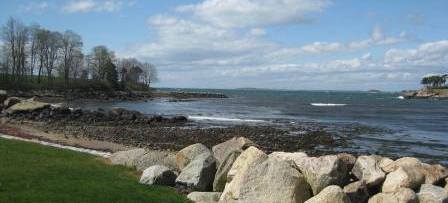
 Whenever possible, education programs at MHS provide educators with opportunities to explore landscapes related to the Society’s documents and artifacts. We were fortunate to take several field trips this summer to locales in Boston and beyond. Participants in our Thomas Hutchinson workshop spent a beautiful summer day exploring the
Whenever possible, education programs at MHS provide educators with opportunities to explore landscapes related to the Society’s documents and artifacts. We were fortunate to take several field trips this summer to locales in Boston and beyond. Participants in our Thomas Hutchinson workshop spent a beautiful summer day exploring the  Our Constitution workshop participants were able to discuss the ratification process in the elegant surroundings of Boston’s John Adams Courthouse, home of the Supreme Judicial Court of Massachusetts. (Pictured on right.) Of course, not all of our excursions were land-based. In early August, twenty teachers from the Boston area participated in a workshop at Fort Warren on Georges Island, part of
Our Constitution workshop participants were able to discuss the ratification process in the elegant surroundings of Boston’s John Adams Courthouse, home of the Supreme Judicial Court of Massachusetts. (Pictured on right.) Of course, not all of our excursions were land-based. In early August, twenty teachers from the Boston area participated in a workshop at Fort Warren on Georges Island, part of 